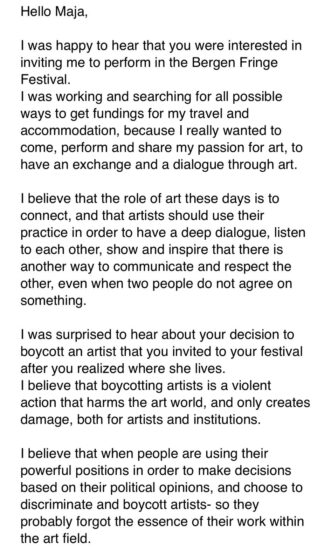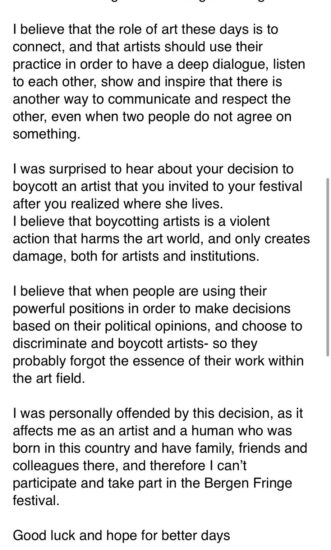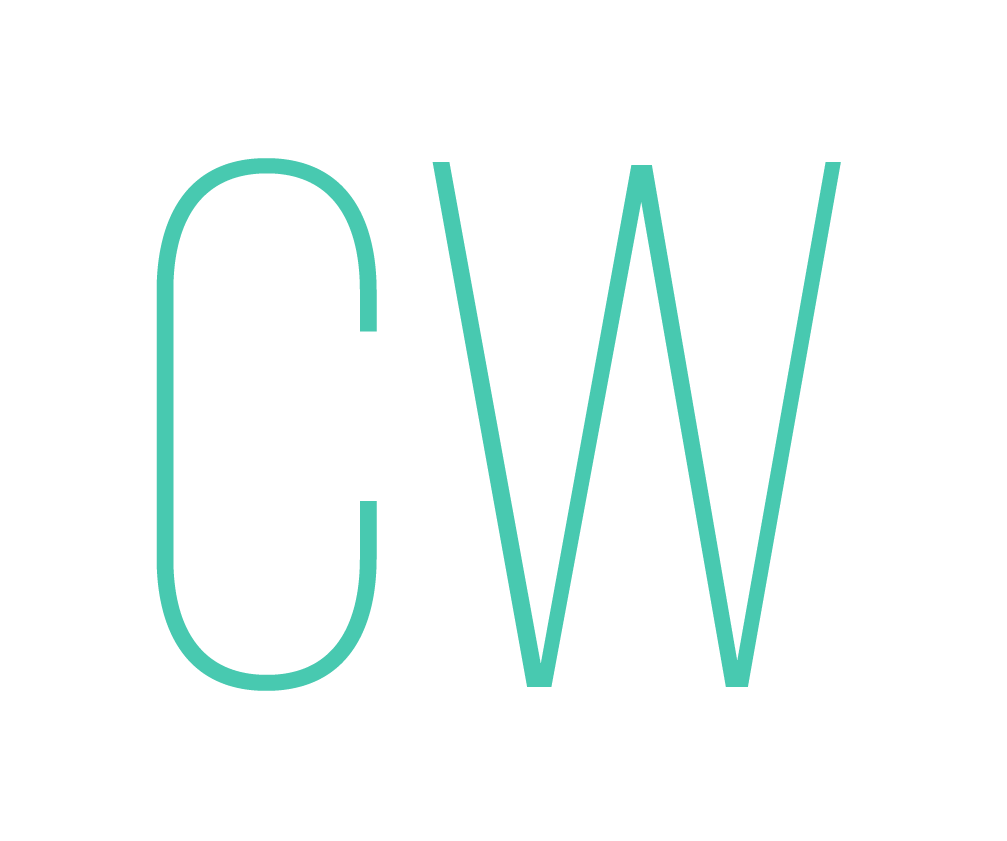We Regret to Inform You That You Have Been Canceled
One of the things I felt I lost on October 7 was my ability to write. I continued to parent, cook, wash and fold, perform, create (after a long pause), but writing was the last to return.
Then, earlier this week, I received this email. The context: last year I answered an open call to the Baltic Nordic Fringe Network, which is an umbrella for seven fringe festivals in Scandinavia. I was invited to present Birth Preparation Course at the Norway Fringe Festival in Bergen. Due to the festival’s budget, they are not able to provide anything other than revenue from ticket sales. I approached the Israeli Ministry of Foreign Affairs, who put me in touch with the cultural attache at the Israeli Embassy in Norway. She immediately committed to assisting me in whatever way she could. However, due to scheduling and the insanely high cost of living in Norway, I wasn’t able to attend. Though I had not confirmed my arrival, the festival advertised my show as the opening event on their website.
This year, I was once again invited to present Birth Preparation Course. I was thrilled. And then this:
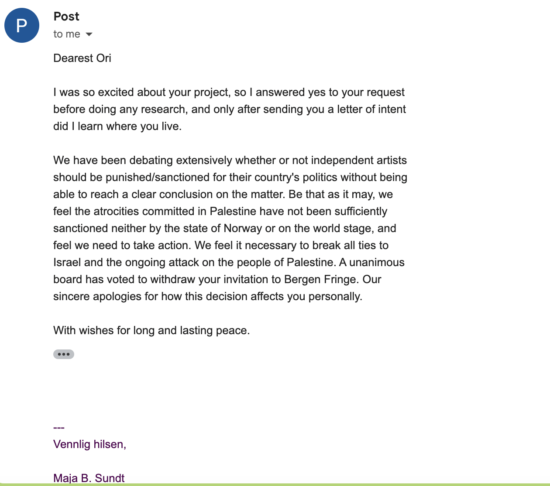
It took me a couple days to construct a response.
This is it:
Dearest Maja,
It is strange to call you Dearest seeing as we’ve never met. You know very little about me and I little about you. Our lives converged for a moment thanks to our shared passion for the arts, which is a beautiful thing.
I was deeply touched by your enthusiasm about my work and I understand that this decision was not yours alone rather that of the organization you work for. Therefore, the following is not directed at you alone. Furthermore, I ask that you send this to your board of directors, the individuals who unanimously decided to withdraw my invitation.
As I said before, you know little about me, where I come from and where I live. As a matter of fact, you cannot confirm or deny if I am A. an artist of Palestinian descent, B. someone who lost members of their immediate family in the October 7 atrocities, which you forgot to mention in your email; or C. a person who is no longer residing in Israel.
I imagine any one of these scenarios would have shifted your perspective on me.
None of them are true.
I am a proud Israeli citizen, a proud Canadian, a proud Jew, an artist, a journalist, a mother, and someone who has been traumatized and deeply impacted by the past six months in ways you cannot imagine. I will not add here the various political beliefs that I hold or the actions I have taken to actualize those beliefs – because I shouldn’t have to. I live here, in this reality, with all it entails for my family and my neighbors and friends. You do not. The board of the festival does not.
I am a person who holds the belief that the arts are about creation, about affording spaces in which we can connect, communicate, heal and be together regardless of our religion, background, nationality, sexuality and so on and so forth. I have experienced these connections all around this planet and they are magical. They are the reason I continue to work in this field.
The piece I was invited to present, Birth Preparation Course, is about universality, about what unifies us as human beings so it is doubly disturbing that you have chosen to remove it from your program solely because of “where I live”. Is it really about where I live, Tel Aviv to be specific, or is it my citizenship? Perhaps my religion? If so, I recommend you put an appendix in your next open call specifying that Israeli and Jewish artists need not apply. Perhaps there are other demographics you find offensive? Applying takes time and effort and the least you can do is to save those undesired individuals the time it takes to fill out your forms.
And speaking of time and effort, your festival requires the artists and their benefactors to invest in the platform. Without their contribution, there is no festival. You offer the least monetary support of any festival I’ve been invited to, meaning you expect the artists to give the most; flights, accommodation, internal transport, technical fees and per diem. That is a heavy burden for even the most luxuriously funded artists.
It was difficult to read your letter without words like antisemitism, prejudice and discrimination bubbling up. Given that you clearly don’t see this, I prefer not to contribute my hard-earned money to your festival.
By choosing to revoke my invitation, which your festival has offered for two consecutive years, you silence one voice. You remove just me from your platform. I would happily incur this loss if I believed it helped a single soul anywhere. This type of “taking action” is destructive and harmful to the wrong people and bears no weight for those you claim to be standing with. How does canceling and banning progressive Jewish artists help Palestinians? How can adding more pain to the world help alleviate suffering?
Had you written that you feared for my safety, that would be one thing. Had you written that you worry that my presence in the festival will negatively impact the ticket sales of other performances and cannot take the risk, I could live with it. But that isn’t what you wrote. You wrote that you have revoked your invitation because of where I live.
You wrote that you have debated punishing individual artists yet haven’t made a clear decision on the matter.
I believe you have.
I wish you the best with the festival. I hope this exchange will clarify some things for you and your organization. It has certainly clarified things for me.
Ori
“The opposite of war isn’t peace, it’s creation.” -Jonathan Larson, Rent
Though I in no way “feel better” about what has happened here, or about the situation in general, it is a source of some solace to be able to write.
UPDATE: Yesterday, April 17, I was interviewed by a reporter from the Norwegian magazine Dagen. At the end of our conversation he said he planned to speak with the festival and their funders.
This morning, I received this email from Maja.
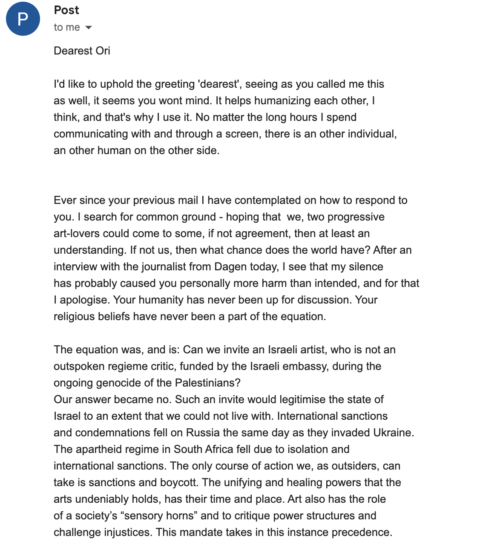
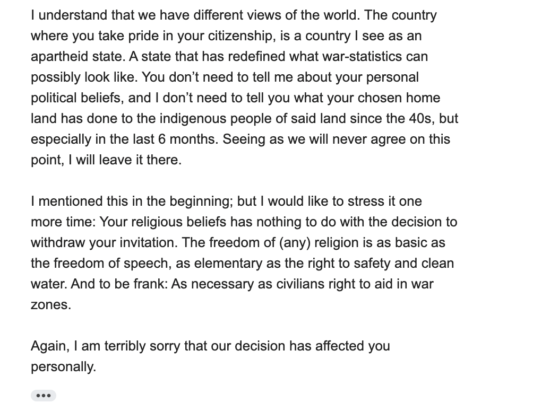
On April 19, Norwegian publication Dagen posted this article about the event by Bjorn Hammerstad.
Following the article, cultural editor Danby Choi responded in this article, also published in Dagen.
Dagen’s Editor-in-Chief Vebjorn Selbekk then published this.
And now in Bergensavisen, by Siv Berg Lutro.
For Hebrew readers, this article is by Nissan Shtrauchler for Yisrael Hayom.
Update: on April 24, Norwegian media outlet NKR published this article by Silje Rognsvag reporting that the festival has been indefinitely postponed as a result of the situation.
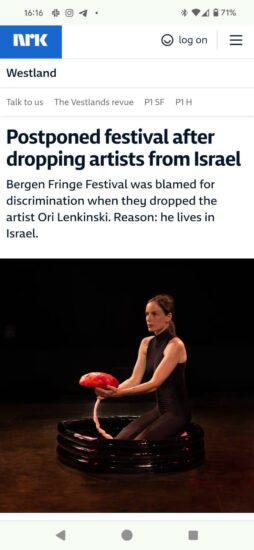
Subjekt then published this by Danby Choi.
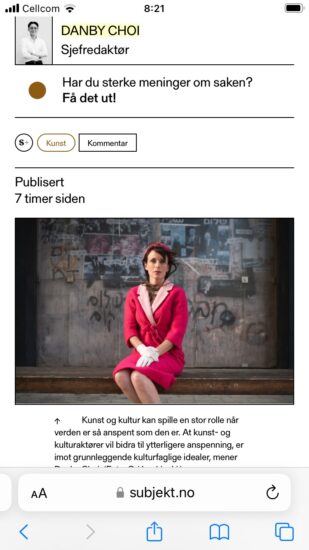
As it turns out, another Israeli artist who lives abroad, was programmed for this year’s festival. Following the release of the exchange between the festival and myself, they wrote this:
